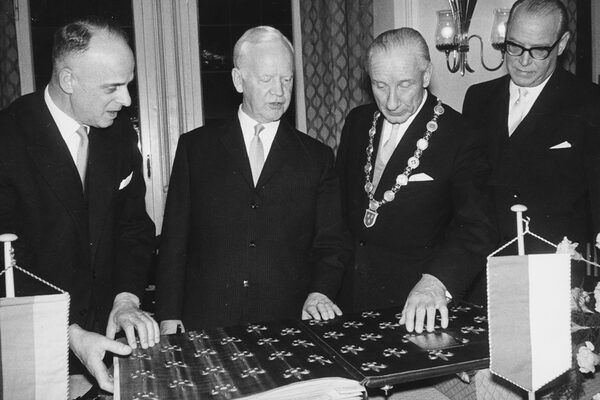Federal President Heinrich Lübke
On November 30, 1959, Federal President Heinrich Lübke signed the Golden Book of the City of Wiesbaden.
Heinrich Lübke was born on October 14, 1894 in Enkhausen in the Sauerland region.
He interrupted his studies in geodesy, agriculture and agricultural engineering at the Agricultural Academy in Bonn in August 1914 to volunteer for the First World War.
After the war, he completed his studies as a surveying and cultivation engineer in 1921. He then studied economics in Münster and Berlin until 1924. From this time onwards, he worked in various agricultural companies and was also politically active in the Center Party.
In 1932, he became a member of the Prussian state parliament for this party, but had to give up his seat after the National Socialists seized power and the state parliament was dissolved. After 20 months in custody, he lived on his brother's farm and supported himself with odd jobs until he found permanent employment from 1939 to 1945 as a surveying engineer and construction manager at an architecture and engineering firm with close ties to the National Socialists.
After the Second World War, he joined the CDU and was a member of the first state parliament of Westphalia. From 1947 to 1953, he was North Rhine-Westphalia's Minister for Food, Agriculture and Forestry. After a first brief mandate as a member of the Bundestag from 1949 to 1950, Lübke was a member of the German Bundestag from 1953 until his election as Federal President in 1959 and Federal Minister of Food, Agriculture and Forestry in the federal governments led by Dr. Konrad Adenauer.
After his election to the highest office of state, he made inaugural visits to Germany and abroad.
During his stop in Hesse, he was received at Wiesbaden City Hall on November 30, 1959 and, like his predecessor and successors, signed the city's Golden Book.
Heinrich Lübke died in Bonn on April 6, 1972.
